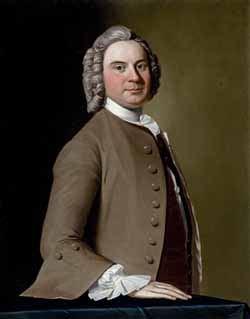John Rowe Near the End of the Siege
On 17 Mar 1776, the last ships carrying British soldiers and Loyalists pulled away from Boston’s docks.
John Rowe wasn’t on one of those evacuation vessels. That might have surprised some people because that merchant was a native of England, an Anglican, and, according to the crowd inside Old South Meeting-House on 30 Nov 1773, “a good Tory.”
But Rowe was what people called a “trimmer,” adjusting his political stances to what seemed popular and advantageous. On 16 Mar 1775 he wrote disapprovingly in his diary about a Thanksgiving called by the Massachusetts Provincial Congress, and then at some point he went back and wrote in new words to make it look like he was fine with that, as I quoted here.
That said, I come away from reading Rowe’s diary with the feeling that whatever he wrote at the time he really meant. Maybe he’d change his position in a few weeks, but when he sat down of an evening to record the day’s events he was sincere. Rowe’s emotions come through when he wrote about himself, even as he tries to suppress them like a good eighteenth-century gentleman.
So I’m going to recount the evacuation of Boston through John Rowe’s eyes. His journal has been published in edited form twice, in the Massachusetts Historical Society Proceedings in 1895 and again with more accurate misspellings in 1903. It’s now available in full digitally through the Massachusetts Historical Society’s website.
Rowe almost obsessively recorded whom he dined with at midday and whom he spent the evening with. He often described the weather, and every Sunday included details about the church service he attended. A lot of that detail was repetitive and left out of the printed editions. Here, for example, is Rowe’s full entry for 1 Mar 1776, with the words printed in the published editions in boldface:
The next daily entry doesn’t appear in either of the printed editions despite—or probably because of—how it recorded an interesting event:
So far that month, life was going on normally—or not going on, in the case of Capt. Johnson. Despite the fact that Rowe was living in a besieged town during a civil war.
TOMORROW: The shooting starts.
John Rowe wasn’t on one of those evacuation vessels. That might have surprised some people because that merchant was a native of England, an Anglican, and, according to the crowd inside Old South Meeting-House on 30 Nov 1773, “a good Tory.”
But Rowe was what people called a “trimmer,” adjusting his political stances to what seemed popular and advantageous. On 16 Mar 1775 he wrote disapprovingly in his diary about a Thanksgiving called by the Massachusetts Provincial Congress, and then at some point he went back and wrote in new words to make it look like he was fine with that, as I quoted here.
That said, I come away from reading Rowe’s diary with the feeling that whatever he wrote at the time he really meant. Maybe he’d change his position in a few weeks, but when he sat down of an evening to record the day’s events he was sincere. Rowe’s emotions come through when he wrote about himself, even as he tries to suppress them like a good eighteenth-century gentleman.
So I’m going to recount the evacuation of Boston through John Rowe’s eyes. His journal has been published in edited form twice, in the Massachusetts Historical Society Proceedings in 1895 and again with more accurate misspellings in 1903. It’s now available in full digitally through the Massachusetts Historical Society’s website.
Rowe almost obsessively recorded whom he dined with at midday and whom he spent the evening with. He often described the weather, and every Sunday included details about the church service he attended. A lot of that detail was repetitive and left out of the printed editions. Here, for example, is Rowe’s full entry for 1 Mar 1776, with the words printed in the published editions in boldface:
Primo March 1776 Fryday very Cold WNW—blows freshRowe was still trading across the Atlantic—and not just within the British Empire since Oporto was in Portugal.
My Brigg Sukey went down in Order to Proceed to Oporto—
I dind at home with Mrs. Rowe & Spent the Evening at home with Richd. Green & Mrs. Rowe
The next daily entry doesn’t appear in either of the printed editions despite—or probably because of—how it recorded an interesting event:
2d. March 1776 Saturday A Pleasant morming WSo.W—The “Possee” was Rowe’s usual club or circle of friends.
This morning Capt. Johnson of the Minerva drown’d himself
I dind at home with Mr. [Ralph] Inman Mrs. Rowe & Jack Rowe—
& Spent the Evening at home & at the Possee
So far that month, life was going on normally—or not going on, in the case of Capt. Johnson. Despite the fact that Rowe was living in a besieged town during a civil war.
TOMORROW: The shooting starts.


No comments:
Post a Comment